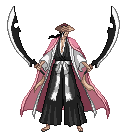Yeah, that's right. You're reading it correctly. Playing fair is playing to lose.
No, I'm not encouraging cheating.
By playing fair, I mean playing along with your opponent - doing what's expected of a Naruto deck. You have good ninjas over the entire curve, you have the best missions in your element, you have the best jutsus split over removal and negation...
And you have a deck that does nothing and loses.
This is one of the biggest mistakes I see people make. They take a bunch of good cards, put it into a deck, and everything looks good on paper - but that's not actually a deck - it's just a pile of good cards. They have no plan beyond "I'm going to play a bunch of good cards and then I guess I'll just win after all my opponent's ninjas die."
Stupid stupid stupid.
Not to bash the Florida players, but they're the best example of this flawed "good stuff" thinking. It used to be Monowater, and now it's Monofire - but at every legitimate large event a bunch of Florida players will show up with the exact same combination of solid ninjas, solid card draw, solid removal... and then fail to win the event.
They're solid players, so they top. Their decks are consistent, so they top.
But they don't win.
(Actually, they do win sometimes. Chris Starr won a large Jonin with Freedori. Lucien Lemelin won a large Jonin with Five-Pronged Seal. This fits in perfectly with my point.)
Look at the Sannin winning decks - Freedori, Dogs, and Greedy.dec. All three decks are capable of making explosive, game-changing plays. They are proactive decks. They make the plays, and force the opponent to respond or lose. Whether it's Chidori and Inherit, or Kakashi ANBU Days or Puppet Overload, these decks can do something special that the fair decks simply can't do. They dictate the terms of the game.
Look at the decks that lose in the elimination rounds - boring Monofire/Monowater, 9K and boring Fire, and more 9K and boring Fire. What's the commonalities with these decks? They're all fair decks. They have no explosiveness short of a removal-heavy draw. They allow the opponent to play the game, and then react to what the opponent does. They play the game on the opponent's terms.
Remember the reign of 9000? When the vast majority of the Naruto world claimed that Gaara was busted beyond belief and a staunch few downplayed it? Gaara was in fact busted beyond belief... if you subscribed to the school of thought that only played fair decks. Because in a battle between fair decks, 9K would always come out on top. It had such a superior card advantage engine (both quantitatively and qualitatively) relative to other fair decks there was no way it could lose.
Naturally, the deck won the Mist Kage in Florida. This was entirely expected given Florida's propensity for fair decks. It took the weaker Sand and Stone Kages... that too, could be expected. In a weak field, consistency and playskill is usually enough to win.
But despite its gaudy early results, the reality was that it was a fair deck, with all the weaknesses of fair decks. In the Cloud Kage, Bruce Jivens decided he was going to force 9K to play the game without Gaara by using free BR missions and Caged Bird. Bruce dictated the field of battle. Gaara couldn't respond.
In the Leaf Kage, I decided I was going to go faster than 9K by demolishing its early game with Hybrid NVS. Let me get BRs? NVS was going to finish it before Gaara could become relevant. Try to defend? I can OV your teams as early as turn 1, and am much better equipped to fight in the early and mid game. Again: I forced 9K to play the game on my terms. 9K could not compete on those terms.
At Sannins, Jerry decided he was going to make more ninjas than Gaara could remove, and hamstring 9K's ability to fight back by abusing that swarm with TN/playing jutsus that Gigantic Fan couldn't hit. Jerry forced 9K to try to answer a threat it couldn't answer - and yet again the fair deck just could not compete.
"There are no wrong threats. There are only wrong answers."
You'll hear me repeat that phrase time and time again - it's because it's the perfect metaphor for the thinking that allows skilled players to take advantage of fair decks.
When you play a fair deck, understand this: you are dramatically limiting your upside. Your deck might have more consistent draws and be better against bad decks... but your best draw will never be able to consistently beat the best draw of an unfair deck. Your mediocre draw is still going to go 50/50 against other mediocre draws, and your bad draws won't beat anything.
When you play an unfair deck, you get that small boost in expected value - and in the long run, that usually means the difference between complete victory and second place.
-Josh 
(Note: I'm going to expand more on this. Too tired right now.)
 Mike Alpers said...
Mike Alpers said...
 Shinfitz said...
Shinfitz said...
Run By:
Patrick O'Neill
(Tsu Kiyo Me)
Andrew Kardis
(Zero)
Joshua Lu
(JDragon)
Staff Writer(s):
Nick Botchis
(Shino'sDad)
March 2010
April 2010
May 2010
June 2010
July 2010
August 2010
September 2010
October 2010
November 2010
December 2010
January 2011
February 2011
March 2011
April 2011
May 2011
June 2011
July 2011
August 2011
October 2011
November 2011
January 2012
February 2012
March 2012
April 2012
May 2012
July 2012
August 2012
June 2013